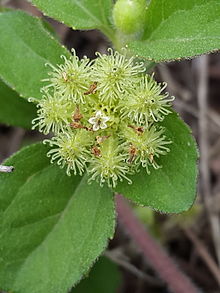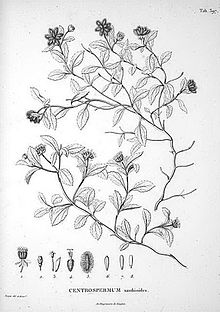Acanthospermum australe
Appearance
| Acanthospermum australe | |
|---|---|

| |

| |
| 1820 illustration[1] | |
| Scientific classification | |
| Kingdom: | Plantae |
| Clade: | Tracheophytes |
| Clade: | Angiosperms |
| Clade: | Eudicots |
| Clade: | Asterids |
| Order: | Asterales |
| Family: | Asteraceae |
| Genus: | Acanthospermum |
| Species: | A. australe
|
| Binomial name | |
| Acanthospermum australe | |
| Synonyms[2] | |
|
Synonymy
| |
Acanthospermum australe (Paraguayan starburr,[3][4] ihi kukae hipa, Paraguay bur, Paraquay starbur, pipili, sheepbur, or spiny-bur) is a South American species of herbaceous plants first described as a species in 1758.[5][6][7]
Distribution
[edit]The species is native to:[8]
- South America, within Brazil, French Guiana, Guyana, Suriname, Venezuela, Argentina, Paraguay, Uruguay, Bolivia, and Colombia
- Caribbean, within Grenada; Martinique; St. Vincent, and Grenadines
It has been introduced in China, and is an invasive species in parts of the United States, Canada, and South Africa. It is currently a widespread pioneer in the tropics and sub-tropics.[9][10][11]
Extracts
[edit]Extracts of Acanthospermum australe have in vitro antiviral activity against herpesvirus and poliovirus,[12] but clinical effects have not been studied.
References
[edit]- ^ Nova genera et species plantarum, vol. 4: plate 397, by Humboldt, F.H.A. von, Bonpland, A., Kunth, K.S.
- ^ The Plant List, Acanthospermum australe (Loefl.) Kuntze
- ^ Acanthospermum australe. United States Department of Agriculture Plants Profile
- ^ "Acanthospermum australe". Integrated Taxonomic Information System.
- ^ Loefling, Pehr. 1758. Iter Hispanicum 268–269
- ^ Kuntze, Carl Ernst Otto. 1891. Revisio Generum Plantarum 1: 303 in German
- ^ Tropicos, Acanthospermum australe (Loefl.) Kuntze
- ^ "Acanthospermum australe". Germplasm Resources Information Network. Agricultural Research Service, United States Department of Agriculture. Retrieved 12 January 2018.
- ^ Tropicos specimen listings, Acanthospermum australe
- ^ Flora of North America Vol. 21 Page 37 Acanthospermum australe (Loefling) Kuntze, Revis. Gen. Pl. 1: 303. 1891.
- ^ Biota of North America Program 2013 county distribution map
- ^ Rocha Martins, LR; Brenzan, MA; Nakamura, CV; Dias Filho, BP; Nakamura, TU; Ranieri Cortez, LE; Garcia Cortez, DA (2011). "In vitro antiviral activity from Acanthospermum australe on herpesvirus and poliovirus". Pharmaceutical Biology. 49 (1): 26–31. doi:10.3109/13880209.2010.493177. PMID 20819023. S2CID 19233517.
 Media related to Acanthospermum australe at Wikimedia Commons
Media related to Acanthospermum australe at Wikimedia Commons
